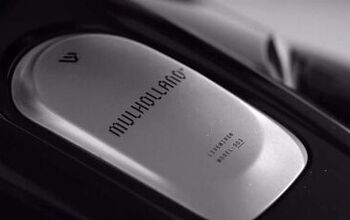46 Views
RE Higdon Disgruntled
by
John P Burns
(IC: )
Published: June 11th, 2003
Share
Robert E. Higdon considers it his moral duty to bring that rude, ludicrous part of modern society to its knobby knees... a fun thing to watch.
Where Kangaroos Fear to Tread
By Bob Higdon
The notice that appeared on my doorstep was addressed to the registered owner of a BMW motorcycle with District of Columbia license plate MC268. It advised that at 4:51 p.m. on December 7, 2001 --- another date that will live in infamy --- a radar camera in the 5700 block of MacArthur Boulevard, N.W., Washington, D.C. detected the operator of said vehicle traveling at 39 mph. The posted speed limit on that six-lane arterial highway, divided by a median strip wide enough to plant Bradford pear trees (Pyrus calleryana), is 25 mph.
Only one penalty could purge such massive guilt: $50. No trip to traffic school was offered; no
community service would suffice. Although the city had consistently denied that its motive for using radar cameras was to shore up a disintegrating treasury, it was obvious even to small children that millions of dollars were flowing into the city's coffers from the resulting fines.
On the back of the notice the registered owner was advised that if guilt were denied and a hearing
requested, the appropriate box on the form should be checked and returned "within thirty days of the mail date of this ticket." The mail date was December 18. Without admitting my name, much less that I was the registered owner of the offending motorcycle, I duly denied having committed the infraction, checked the box to request a hearing, and mailed the form back to the Automated Traffic Enforcement Office (ATEO) on January 15, 2002. Now, boys and girls, can we at least agree that January 15 is within 30 days of December 18?
On January 23 ATEO sent me a Notice of Deemed Admission, stating that I had failed to answer the
initial notice within 30 days "from issuance [December 8]." As a result, a registration hold was placed on the bike and the fine was doubled to $100. You cannot imagine the effect that this notice had upon my otherwise sunny disposition.
I wrote to the troglodytes at ATEO on January 26, pointing out that I had mailed the denial form back to them within 30 days the date they themselves had demanded. "Your records, if you actually keep them and if you can actually find anything in them, will bear that claim out," I observed with some heat.
Next I turned to the remaining problems. "You will either remove that hold on the registration
forthwith and advise me that you have done so or I will sue this city and any ignorant bureaucrat who has come anywhere close to this file for the intentional infliction of emotional distress, tortious interference with property, and any other claim I can dream up. Am I making myself clear?"
I closed with a deferential plea: "Now give me a court date as I demanded and stop sending me your
worthless threats." I sent copies of this screed to my city council representative and the mayor, both slack-jawed timeservers who have no better concept of running your nation's capital than a sewer rat has of playing the tuba.
One week later ATEO reversed itself and set a hearing for March 14 at 7:30 a.m., which is about two
hours after I usually retire for the night. These clowns were plainly prepared to drill into my soft underbelly. The next step was to visit one of these hearings and see how they operate. Any lawyer, even a recovering lawyer like me, either does that or ends up having a nail driven into his skull. Some minimal preparation simply cannot be skipped. But I skipped this, I'm ashamed to say. You get busy. Things happen. You know how it goes.
Still, on the appointed date and time, I showed up, thinking that no matter how loose the rules were, how grim could this low-rent hearing be? Well, grim enough that at one point I started laughing. But I have gotten ahead of myself. Come with me as I recall through a deep, dark veil of boiling anger what transpired in the next twelve minutes.
I was summoned into a room. Three others sat there. Two of them were defendants, sweating like French whores. A man in a suit sat behind a bench on a dais. He called our names. We responded. He looked at me and told me he was going to administer an oath. I suggested that I'd be overjoyed to testify as soon as the government had proved a prima facie case against me.
The suit then invited me up to his bench. Some papers lay on the desk. He pointed at a photo
apparently taken by the radar camera. He recited the details of the alleged infraction, explained how radar cameras work, and asked if I had any questions.
"I have lots of questions. The first one is: Who are you?"
He said that he was the hearing examiner.
"Oh," I said, "I thought you were the courtroom clerk. If you are here instead to answer questions,
let me ask if you first intend to administer an oath to yourself?" He declined to do so.
"Were you there?," I asked, pointing at the photograph. He admitted that he was not. "Then I'll
reserve my questions for the person who was."
He invited me to return to my seat. I did so.
"No one will be here to answer questions," he said quietly.
"Fine," I said. "I then move to dismiss this case on the grounds that the government has utterly
failed to prove anything remotely resembling my guilt. It has not even attempted to prove that I am
the owner of the vehicle in question."
"These papers prove it," the examiner rejoined.
"They prove nothing of the sort, as any first-year law student would know. They weren't even offered as evidence. Those papers on your desk are merely an irrelevant pile of self-serving hearsay. Maybe in Bunnyland such documents authenticate themselves with secret potions and magic, but they won't do it here unless you've figured out a way to repeal the Fifth Amendment."
I paused, anticipating his next move. "Furthermore, if you even think about trying to introduce them, now that I have pointed out the gaping holes in this ludicrous case, I will object on a dozen different grounds, not the least of which is that apart from your duties as a hearing examiner, you would then be taking on the role of prosecutor. Such a combination of functions is legal only in North Korea, if I am not mistaken. It is abundantly clear that you will soon be serving as judge and jury as well. You lack only a job as my defense counsel to complete a rare courthouse hat trick, but I'll mercifully relieve you of that duty, sir."
He denied my motion.
I asked him to take judicial notice of a stack of newspaper clippings showing that identical radar
camera laws had been thrown out in San Diego and Denver because the civilian contractor who set up the cameras was taking a $29 cut out of every speeding fine paid. "A moron can see that is prosecution by contingency fee, a practice that has been condemned even in Upper Volta," I noted for the tape recorder's benefit.
Denied.
"When, not if, I am convicted, the appeal will be adjudicated by the same private contractor who is
taking a percentage of the fine I am to pay. For all I know, you're in the employ of that contractor as well. This is a practice that is legal only in the Maldive Islands, I believe. Will you take
judicial notice of that fact?"
Denied.
"I move that you take judicial notice of the fact that on the first day that these cameras became
operational last summer they were cranking out four tickets per second in the very block where this case is alleged to have originated. This isn't about safety; it's about trying to balance a hemorrhaging budget on the backs of motor vehicle operators. Here's the front page story from the Washington Times." I waved it at him.
Denied.
"Upon my conviction, you must fine me $50, not $100. The document advising me of the due date for
responding to the charge was ignored by the private contractor, representing yet another monetary trap for the unwary. A counter clerk at McDonald's can see that this is a class action lawsuit waiting to happen, and when it does, I hope it cracks the financial back of this deranged town."
He stared at me wordlessly.
"Finally, I object that this hearing, such as it is, blatantly violates the Fourth, Fifth, Sixth,
Eighth, and Fourteenth Amendments to the Constitution, eviscerates the D.C. Code of Municipal
Regulations, and abrogates the Treaty of Ghent. Now do your worst."
"Guilty."
It didn't matter. Nothing would have mattered. A corrupt result had been ordained from the instant the camera's lens snapped. My fine stood at $100, payable immediately, and if I wanted to take an appeal, it would require posting an additional $40 fee to handle the transcript and miscellaneous drivel. I paid the money but didn't learn until later that in traffic court appeals no one is allowed to appear. It provides the illusion of justice without any of the mess.
Months passed. A city council member introduced a bill that would cancel the contingency fee
arrangement with the contractor. The bill died in committee, proving anew that the District of
Columbia can no longer function without the loot vacuumed in by radar cameras. In October of last
year, the mayor admitted in an interview that the cameras were about money after all. A week later the American Automobile Association, which had stood behind the program from the beginning, withdrew its support. The cameras kept clicking.
More months passed. I considered filing a suit in the small claims branch of D.C.'s Superior Court to recover the $140, justice delayed being justice denied and all that. Then in late April of this year an envelope arrived from the D.C. treasurer's office. It held a check, payable to me, in the amount of $140. More than fifteen months after it had begun, this lame joke finally delivered its punch line.
The city remains in deep economic trouble. It has survived assaults on the radar camera law so far by dismissing or otherwise shuffling suits into the Dead Zone docket of Superior Court, but it can't do that forever. At least one class action lawsuit, just as I'd predicted, is winding its way through the legal swamp. I think that's why my case turned out the way it did. The administrators of the radar camera program are avaricious thugs without a scintilla of social conscience, but they're not complete imbeciles. They had to know I would keep snapping at their ankles until I attracted the attention of a real judge, not a dim-witted kangaroo in a cheap suit. They literally can't afford to let that happen.
Eventually the entire program will drop like a bag of hammers, the city's bond rating will sink to ZZZ or worse, and Congress will reconsider the entire Home Rule experiment. It can't come soon enough for me. I barely care any longer that Osama bin Laden has painted a bull's eye at the base of the Washington monument. I recently bought a ninth-floor condo on the beach in Daytona.
Still, despite the handwriting on the wall, the day of the radar camera's extinction is not yet at
hand. Ten days ago I was chugging along on the bike at a speed guaranteed to trip a radar camera on a Crown Victoria's front bumper, but the Vic I saw fifty yards ahead of me was light blue. The radar cars are always black. As I passed the vehicle, a light flashed in my mirror.
Ka-ching!
When I arrived home, it took me 15 minutes to dig out my copy of the Constitution and begin assembling the usual trial exhibits. I'm ready. And this time at least I know how things will work.
Get Motorcycle.com in your InboxWhere Kangaroos Fear to Tread
By Bob Higdon
The notice that appeared on my doorstep was addressed to the registered owner of a BMW motorcycle with District of Columbia license plate MC268. It advised that at 4:51 p.m. on December 7, 2001 --- another date that will live in infamy --- a radar camera in the 5700 block of MacArthur Boulevard, N.W., Washington, D.C. detected the operator of said vehicle traveling at 39 mph. The posted speed limit on that six-lane arterial highway, divided by a median strip wide enough to plant Bradford pear trees (Pyrus calleryana), is 25 mph.
Only one penalty could purge such massive guilt: $50. No trip to traffic school was offered; no
community service would suffice. Although the city had consistently denied that its motive for using radar cameras was to shore up a disintegrating treasury, it was obvious even to small children that millions of dollars were flowing into the city's coffers from the resulting fines.
On the back of the notice the registered owner was advised that if guilt were denied and a hearing
requested, the appropriate box on the form should be checked and returned "within thirty days of the mail date of this ticket." The mail date was December 18. Without admitting my name, much less that I was the registered owner of the offending motorcycle, I duly denied having committed the infraction, checked the box to request a hearing, and mailed the form back to the Automated Traffic Enforcement Office (ATEO) on January 15, 2002. Now, boys and girls, can we at least agree that January 15 is within 30 days of December 18?
On January 23 ATEO sent me a Notice of Deemed Admission, stating that I had failed to answer the
initial notice within 30 days "from issuance [December 8]." As a result, a registration hold was placed on the bike and the fine was doubled to $100. You cannot imagine the effect that this notice had upon my otherwise sunny disposition.
I wrote to the troglodytes at ATEO on January 26, pointing out that I had mailed the denial form back to them within 30 days the date they themselves had demanded. "Your records, if you actually keep them and if you can actually find anything in them, will bear that claim out," I observed with some heat.
Next I turned to the remaining problems. "You will either remove that hold on the registration
forthwith and advise me that you have done so or I will sue this city and any ignorant bureaucrat who has come anywhere close to this file for the intentional infliction of emotional distress, tortious interference with property, and any other claim I can dream up. Am I making myself clear?"
I closed with a deferential plea: "Now give me a court date as I demanded and stop sending me your
worthless threats." I sent copies of this screed to my city council representative and the mayor, both slack-jawed timeservers who have no better concept of running your nation's capital than a sewer rat has of playing the tuba.
One week later ATEO reversed itself and set a hearing for March 14 at 7:30 a.m., which is about two
hours after I usually retire for the night. These clowns were plainly prepared to drill into my soft underbelly. The next step was to visit one of these hearings and see how they operate. Any lawyer, even a recovering lawyer like me, either does that or ends up having a nail driven into his skull. Some minimal preparation simply cannot be skipped. But I skipped this, I'm ashamed to say. You get busy. Things happen. You know how it goes.
Still, on the appointed date and time, I showed up, thinking that no matter how loose the rules were, how grim could this low-rent hearing be? Well, grim enough that at one point I started laughing. But I have gotten ahead of myself. Come with me as I recall through a deep, dark veil of boiling anger what transpired in the next twelve minutes.
I was summoned into a room. Three others sat there. Two of them were defendants, sweating like French whores. A man in a suit sat behind a bench on a dais. He called our names. We responded. He looked at me and told me he was going to administer an oath. I suggested that I'd be overjoyed to testify as soon as the government had proved a prima facie case against me.
The suit then invited me up to his bench. Some papers lay on the desk. He pointed at a photo
apparently taken by the radar camera. He recited the details of the alleged infraction, explained how radar cameras work, and asked if I had any questions.
"I have lots of questions. The first one is: Who are you?"
He said that he was the hearing examiner.
"Oh," I said, "I thought you were the courtroom clerk. If you are here instead to answer questions,
let me ask if you first intend to administer an oath to yourself?" He declined to do so.
"Were you there?," I asked, pointing at the photograph. He admitted that he was not. "Then I'll
reserve my questions for the person who was."
He invited me to return to my seat. I did so.
"No one will be here to answer questions," he said quietly.
"Fine," I said. "I then move to dismiss this case on the grounds that the government has utterly
failed to prove anything remotely resembling my guilt. It has not even attempted to prove that I am
the owner of the vehicle in question."
"These papers prove it," the examiner rejoined.
"They prove nothing of the sort, as any first-year law student would know. They weren't even offered as evidence. Those papers on your desk are merely an irrelevant pile of self-serving hearsay. Maybe in Bunnyland such documents authenticate themselves with secret potions and magic, but they won't do it here unless you've figured out a way to repeal the Fifth Amendment."
I paused, anticipating his next move. "Furthermore, if you even think about trying to introduce them, now that I have pointed out the gaping holes in this ludicrous case, I will object on a dozen different grounds, not the least of which is that apart from your duties as a hearing examiner, you would then be taking on the role of prosecutor. Such a combination of functions is legal only in North Korea, if I am not mistaken. It is abundantly clear that you will soon be serving as judge and jury as well. You lack only a job as my defense counsel to complete a rare courthouse hat trick, but I'll mercifully relieve you of that duty, sir."
He denied my motion.
I asked him to take judicial notice of a stack of newspaper clippings showing that identical radar
camera laws had been thrown out in San Diego and Denver because the civilian contractor who set up the cameras was taking a $29 cut out of every speeding fine paid. "A moron can see that is prosecution by contingency fee, a practice that has been condemned even in Upper Volta," I noted for the tape recorder's benefit.
Denied.
"When, not if, I am convicted, the appeal will be adjudicated by the same private contractor who is
taking a percentage of the fine I am to pay. For all I know, you're in the employ of that contractor as well. This is a practice that is legal only in the Maldive Islands, I believe. Will you take
judicial notice of that fact?"
Denied.
"I move that you take judicial notice of the fact that on the first day that these cameras became
operational last summer they were cranking out four tickets per second in the very block where this case is alleged to have originated. This isn't about safety; it's about trying to balance a hemorrhaging budget on the backs of motor vehicle operators. Here's the front page story from the Washington Times." I waved it at him.
Denied.
"Upon my conviction, you must fine me $50, not $100. The document advising me of the due date for
responding to the charge was ignored by the private contractor, representing yet another monetary trap for the unwary. A counter clerk at McDonald's can see that this is a class action lawsuit waiting to happen, and when it does, I hope it cracks the financial back of this deranged town."
He stared at me wordlessly.
"Finally, I object that this hearing, such as it is, blatantly violates the Fourth, Fifth, Sixth,
Eighth, and Fourteenth Amendments to the Constitution, eviscerates the D.C. Code of Municipal
Regulations, and abrogates the Treaty of Ghent. Now do your worst."
"Guilty."
It didn't matter. Nothing would have mattered. A corrupt result had been ordained from the instant the camera's lens snapped. My fine stood at $100, payable immediately, and if I wanted to take an appeal, it would require posting an additional $40 fee to handle the transcript and miscellaneous drivel. I paid the money but didn't learn until later that in traffic court appeals no one is allowed to appear. It provides the illusion of justice without any of the mess.
Months passed. A city council member introduced a bill that would cancel the contingency fee
arrangement with the contractor. The bill died in committee, proving anew that the District of
Columbia can no longer function without the loot vacuumed in by radar cameras. In October of last
year, the mayor admitted in an interview that the cameras were about money after all. A week later the American Automobile Association, which had stood behind the program from the beginning, withdrew its support. The cameras kept clicking.
More months passed. I considered filing a suit in the small claims branch of D.C.'s Superior Court to recover the $140, justice delayed being justice denied and all that. Then in late April of this year an envelope arrived from the D.C. treasurer's office. It held a check, payable to me, in the amount of $140. More than fifteen months after it had begun, this lame joke finally delivered its punch line.
The city remains in deep economic trouble. It has survived assaults on the radar camera law so far by dismissing or otherwise shuffling suits into the Dead Zone docket of Superior Court, but it can't do that forever. At least one class action lawsuit, just as I'd predicted, is winding its way through the legal swamp. I think that's why my case turned out the way it did. The administrators of the radar camera program are avaricious thugs without a scintilla of social conscience, but they're not complete imbeciles. They had to know I would keep snapping at their ankles until I attracted the attention of a real judge, not a dim-witted kangaroo in a cheap suit. They literally can't afford to let that happen.
Eventually the entire program will drop like a bag of hammers, the city's bond rating will sink to ZZZ or worse, and Congress will reconsider the entire Home Rule experiment. It can't come soon enough for me. I barely care any longer that Osama bin Laden has painted a bull's eye at the base of the Washington monument. I recently bought a ninth-floor condo on the beach in Daytona.
Still, despite the handwriting on the wall, the day of the radar camera's extinction is not yet at
hand. Ten days ago I was chugging along on the bike at a speed guaranteed to trip a radar camera on a Crown Victoria's front bumper, but the Vic I saw fifty yards ahead of me was light blue. The radar cars are always black. As I passed the vehicle, a light flashed in my mirror.
Ka-ching!
When I arrived home, it took me 15 minutes to dig out my copy of the Constitution and begin assembling the usual trial exhibits. I'm ready. And this time at least I know how things will work.
John P Burns
More by John P Burns
Published June 11th, 2003 6:00 AM
Motorcycle Insurance



























Comments
Join the conversation